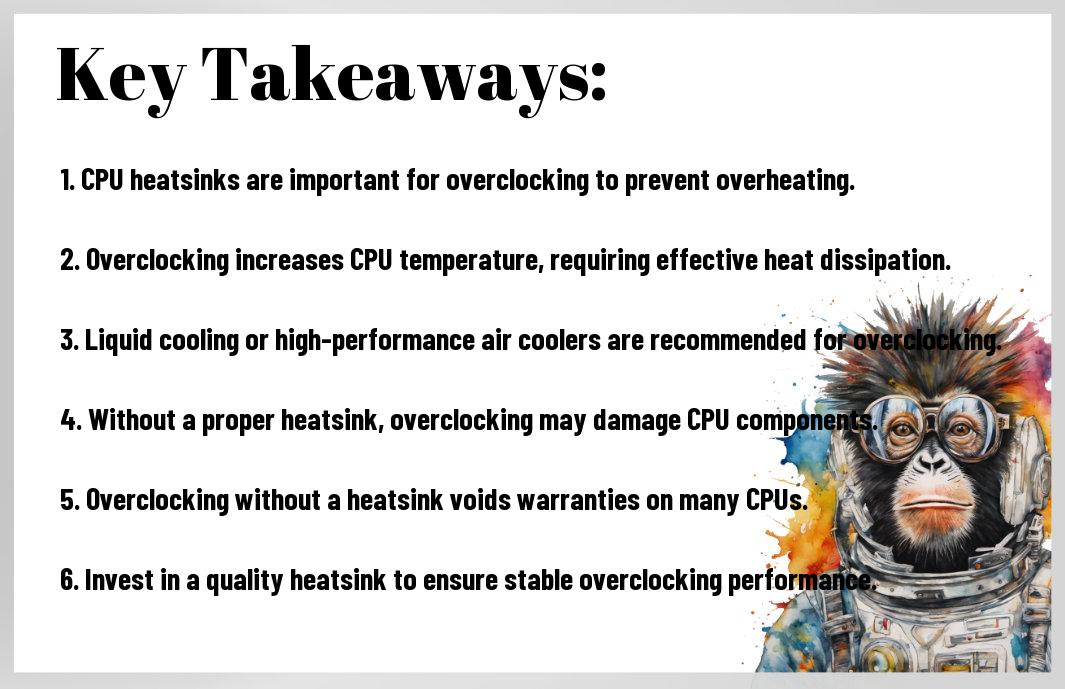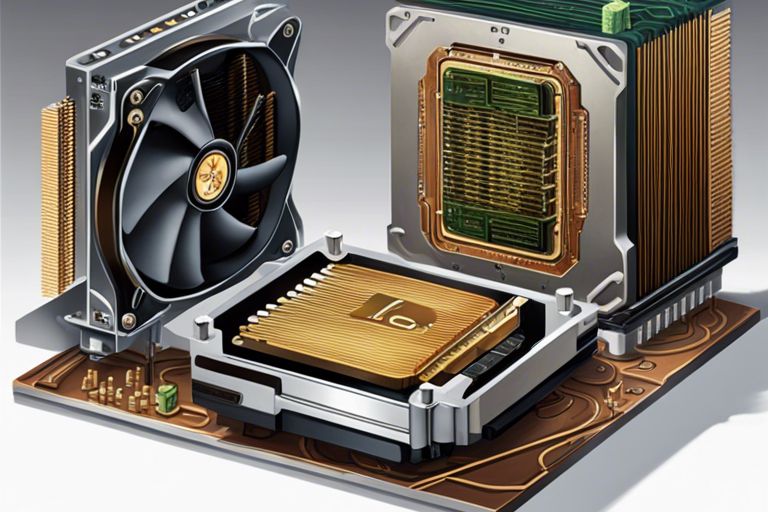It’s time to dive deep into the world of overclocking and address the burning question – are CPU heatsinks necessary for overclocking? As performance enthusiasts push their processors to the limit for that extra speed boost, the heat generated can be dangerous. In this blog post, we’ll explore the importance of CPU heatsinks in preventing overheating and protecting your hardware when overclocking. Let’s get into the nitty-gritty details and find out if your cooling setup is up to the challenge of pushing your CPU to its limits.
Key Takeaways:
- CPU heatsinks are vital for overclocking. They help dissipate heat produced by the CPU during overclocking, preventing thermal throttling and potential damage to the hardware.
- Choosing the right CPU heatsink is crucial. Different heatsinks offer varying levels of cooling efficiency, so it’s important to select one that can handle the increased heat from overclocking.
- Proper installation of the CPU heatsink is key. Ensuring proper contact between the heatsink and the CPU, as well as using the right amount of thermal paste, is vital for optimal heat dissipation.
- Monitoring temperatures is important when overclocking. Keep an eye on CPU temperatures using monitoring software to ensure that the heatsink is effectively cooling the CPU, especially when pushing the limits with overclocking.
- Consider additional cooling solutions for extreme overclocking. In cases of extreme overclocking, additional cooling solutions such as liquid cooling or high-performance fans may be necessary to maintain stable temperatures.

Heatsinks 101: The Unsung Heroes
What the Heck is a Heatsink?
Any savvy tech enthusiast knows that heatsinks are the unsung heroes of keeping your CPU cool. A heatsink is a passive cooling solution that dissipates heat generated by your CPU. It usually consists of a metal structure with fins that help to transfer the heat away from the processor.
Why Your CPU’s Not Chillin’ Without One
To put it bluntly, without a heatsink, your CPU is like a ticking time bomb waiting to overheat and potentially damage your entire system. Heatsinks are crucial for overclocking because they help prevent your CPU from reaching dangerous temperatures, allowing you to push your processor to its limits without frying it in the process.
A good heatsink can make the difference between a stable overclock and a catastrophic failure. By efficiently dissipating heat, heatsinks not only prolong the lifespan of your CPU but also improve its overall performance.
Overclocking Showdown: To Heat or Not To Heat
Pushing Limits: How Overclocking Heat Stress Demands Attention
Limits, if you’re all about pushing your system to the max through overclocking, then you’re no stranger to the heat produced. When you overclock your CPU, you’re importantly asking it to work harder and faster than it was designed to. This increased workload generates more heat, which can lead to instability and even potential damage if not managed properly. Heat dissipation is crucial in these situations, and without a proper cooling solution, you’re playing with fire.
The Balancing Act: Performance vs. Longevity
The, striking the right balance between performance and longevity is key when it comes to overclocking. Sure, you can squeeze out extra speed and power from your CPU by ramping up the clock speeds, but at what cost? Performance gains are exciting, but not if they come at the expense of your CPU’s lifespan. It’s a delicate dance between pushing your system to its limits and ensuring it has a long and healthy life.
To sum it up, when you’re overclocking, it’s important to consider the trade-offs between performance and longevity. Pushing your system to its limits can yield impressive results, but not without risks. Make sure to have a solid cooling solution in place to handle the extra heat generated, and always monitor your temperatures to avoid any potential damage. Ultimately, finding the right balance will ensure that you get the best of both worlds – performance and longevity.
Making the Call: Heatsink or Heatwave
Gamble or Gameplan: Can You Skip the Sink?
After some extensive research and debate in the overclocking community, the question remains – can you get away with overclocking your CPU without a heatsink? It’s a risky move that can lead to disastrous consequences if your system overheats. Sure, you might save a few bucks by skipping the sink, but you’re playing with fire when it comes to the longevity and performance of your processor.
Top Gear: Choosing the Right Heatsink for Your Beast
Any serious overclocker will tell you that a quality heatsink is a must-have when pushing your CPU to its limits. With so many options on the market, selecting the right one can be overwhelming. Don’t skimp on this crucial component – invest in a heatsink that can handle the heat your beastly processor generates.
The right heatsink can make all the difference in your overclocking endeavors. A high-performance heatsink with efficient heat dissipation capabilities can keep your CPU running smoothly even under intense workloads. Look for one that is compatible with your CPU socket and has excellent reviews for its cooling efficiency.
Final Words
On the whole, CPU heatsinks are a crucial component for overclocking your system. They play a vital role in dissipating the excess heat generated by your processor, ensuring it runs efficiently and at optimal performance levels. Without a high-quality heatsink, you risk damaging your CPU and compromising its longevity. So, if you’re serious about pushing your CPU to its limits and achieving that next level of performance, investing in a reliable heatsink is non-negotiable. Be mindful of, it’s always better to play it safe and keep your system cool than to risk the consequences of overheating. Heat is the enemy, and a good heatsink is your best defense in the battle for peak performance!
FAQ
Q: Are CPU Heatsinks Necessary For Overclocking?
A: Absolutely! When overclocking your CPU, the heat generated increases significantly. Without a heatsink, your CPU could overheat and cause damage.
Q: What role does a CPU Heatsink play in overclocking?
A: A CPU Heatsink helps to dissipate the heat generated by the overclocked CPU, ensuring that it runs efficiently and effectively without overheating.
Q: Can I overclock my CPU without a Heatsink?
A: It is not recommended to overclock your CPU without a heatsink. The heatsink is vital for cooling the CPU and preventing damage due to overheating.
Q: How do I choose the right CPU Heatsink for overclocking?
A: Look for a heatsink that is specifically designed for overclocking, with a high thermal conductivity material such as copper or aluminum, and adequate heat dissipation capabilities.
Q: What are some benefits of using a quality CPU Heatsink for overclocking?
A: Using a quality CPU Heatsink can help improve the stability and performance of your overclocked CPU, prolong its lifespan, and ensure optimal cooling efficiency during intensive tasks.




